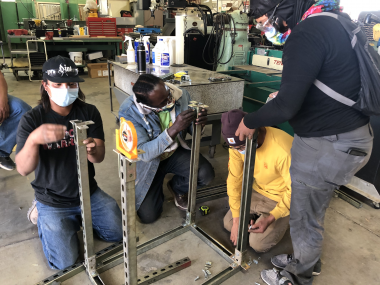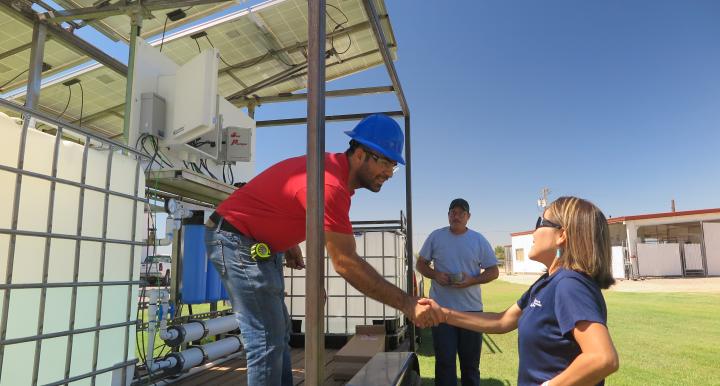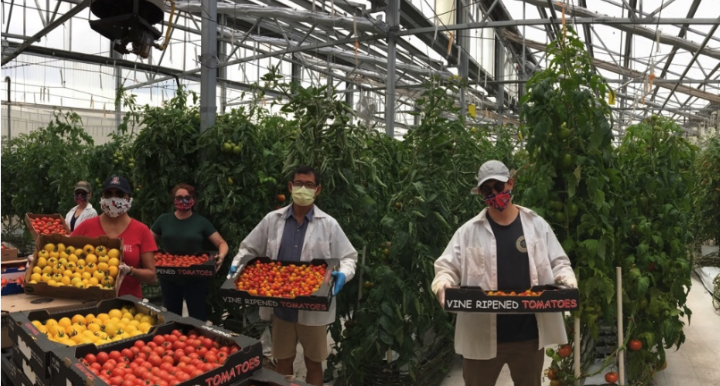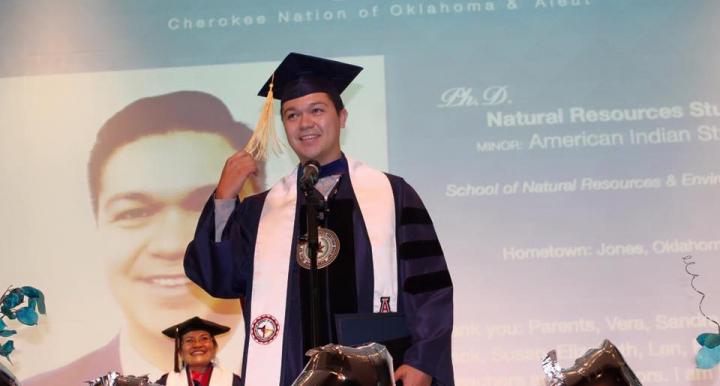By Love Foster-Malave
A partnership between IndigeFEWSS and Sixth-World Solutions (SWS) has received a $100,000 grant from the Arizona Institutes for Resilience (AIR) entitled “Indigenous resilience: Co-designing and deploying off-grid household solar nanofiltration water systems for remote Navajo communities.”
The vision of this 6 month project is to increase Indigenous community resilience, water security and sovereignty through the deployment of off-grid, solar-powered nanofiltration (SNF) water purification systems that are designed, built, and operated by Diné citizens.
This AIR grant forms a multi-disciplinary team and forms a new partnership with Sixth-World Solutions (SWS), a community-based, for-profit business that works within Navajo communities to build local human capacity and pursue sustainable development objectives. Dr. Karletta Chief, IndigeFEWSS PI, and PI of the NSF Research Traineeship program “Indigenous Food, Energy, and Water Security and Sovereignty” said,“This is a dream team combining multiple expertise of Navajo community leaders Janene Yazzie and Kern Collymore with Navajo scientists/professors Dr. Tommy Rock, Dr. Andrew Curley and myself, and off-grid engineering expertise provided by Dr. Robert Arnold and Dr. Vasiliki Karanikola. Making it possible to do real action in a short period of time for the benefit of the Diné people.”
Indige FEWSS Sixth World SNF train 7 of 8.jpeg

Kern Collymore co-founder of SWS says of the project, “Making [this technology] more accessible for local people is the really exciting part to me. It’s addressing one of these major issues of contamination of water sources in Indigenous communities. And [the solar nanofiltration unit] provides additional power, which goes a long way toward meeting immediate needs. [This project provides] the potential of having our own community members have ownership over these systems”
For the ~33% of Diné community members without running water, this grant will provide four water treatment units that produce drinking water and solar power, and train a workforce within the Diné community to construct and deploy these systems. The project aims to accelerate access to potable water and clean energy for off-grid Diné households, by the Diné community, for the Diné community.
Janene Yazzie, co-founder of SWS highlights their Rights Based approach, saying, “A key part of our strategy is to make sure that this project meets the rights, needs, and capacities of the households we are working with; households that have gone too long without access to clean and safe drinking water and cannot wait, or perhaps will never be eligible for, connection to our nation’s electrical grid or industrial water infrastructure.”
Indige FEWSS Sixth World SNF train 4 of 8.png

Dr. Arnold expresses hope that similar technology and workforce development can provide safe drinking water in off-grind locations within Indigenous communities across the country:
“Here we envision an off-grid solution to these problems in which water is purified and limited electrical energy for lighting and other minor needs is provided by the Navajos themselves, creating jobs and keeping revenues on the reservation. At best, [the] proposed work provides only as much light as a match but may brighten a sustainable pathway to off-grid infrastructure that improves the quality of life on the Navajo Nation and elsewhere.”
This newly funded partnership is 1 of 13 projects awarded a Resilience Grant from the Arizona Institutes for Resilience (AIR) and funded by the Technology and Research Institute Fund (TRIF) at the University of Arizona. With the leadership of Dr. Andrew Curley, Assistant Professor in Geography, the grant will aim to understand the perceptions of Diné citizens to SNF systems and if it is technology the community would like to use. The award brings to light the health disparities and water insecurities that COVID-19 has exacerbated within the Diné community.





